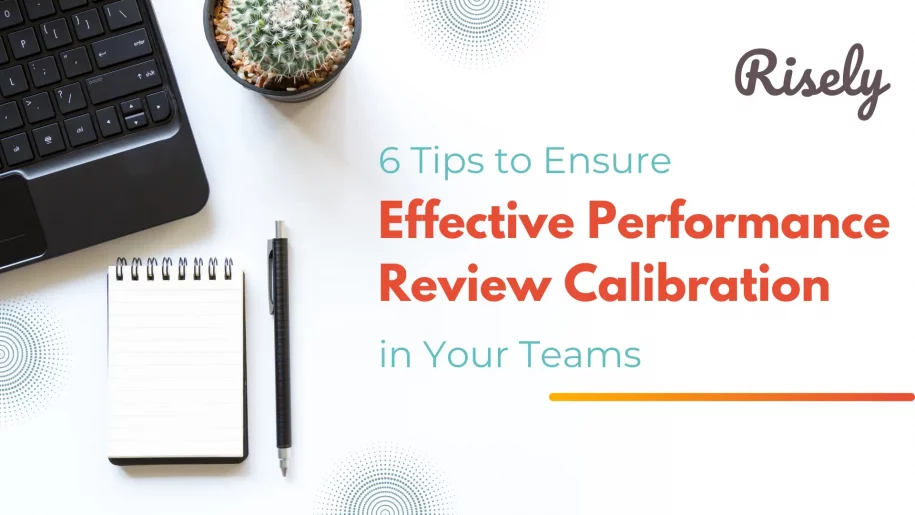6 Tips to Ensure Effective Performance Review Calibration in Your Teams
Performance reviews are vital to any organization’s overall performance management process. They help companies identify critical strengths and areas of improvement for their employees to drive better business results. But what happens when employee evaluations lack consistency and objectivity? The answer is simple – it can lead to skewed results, misjudgments, and poor decision-making. This is where performance review calibration comes in. In this blog post, we will discuss the importance of calibration in performance reviews and how it fosters a culture of transparency and fairness. We will also cover some essential tips and techniques to help you ensure effective performance review calibration for your teams. So whether you’re an HR manager team leader or want to invest in your company’s success, read on to learn how calibration can help unlock your team’s true potential!Understanding the Importance of Performance Review Calibration
Performance review calibration is crucial to ensure fairness and consistency in performance ratings across the organization. It helps identify and address biases that may influence performance evaluations, improving overall performance management and development opportunities. Transparency in the review process enhances employee satisfaction and engagement. Furthermore, performance review calibration aligns individual performance with organizational goals and objectives, ensuring the appraisal process is objective and unbiased. Organizations can mitigate subjectivity and provide accurate and fair employee ratings by leveraging performance calibration meetings. Performance review calibration is essential in creating a robust performance review cycle.Identifying Bias in Performance Reviews
To ensure fair and unbiased performance evaluations, it is crucial to identify and address any implicit biases that may impact performance ratings. Organizations can create a more equitable environment by minimizing the influence of subjective factors in the review process and promoting objectivity through standardized rating scales and performance criteria. It is essential to train managers to be aware of their biases and make fair evaluations. Additionally, encouraging feedback from multiple sources provides a holistic view of performance, further mitigating bias.Developing an Equitable Compensation Framework
Developing an equitable compensation framework offers several benefits to organizations. Teams can promote fairness and transparency by ensuring compensation decisions are based on objective performance measures. It can increase employee satisfaction and retention, especially among high performers who feel rewarded for their outstanding work. Additionally, aligning compensation with individual and organizational goals helps attract top talent by demonstrating a commitment to equitable practices. An equitable compensation framework creates a transparent and fair structure that fosters employee engagement and supports organizational success. Read more: Performance Management and Compensation: 3 PerspectivesFostering a Culture that Encourages Promotions Based on Merit
Developing clear guidelines and criteria for promotion decisions is crucial in fostering a culture that encourages promotions based on merit. By providing training and development opportunities to prepare employees for advancement, you empower them to reach their full potential. Recognizing and rewarding employees who consistently demonstrate exceptional performance is equally important, as this reinforces the value of merit-based promotions. Communication plays a vital role in emphasizing the importance of these promotions to all employees. Creating a supportive environment that values growth and career progression further strengthens the culture of meritocracy.Boosting Your Company’s Reputation Through Effective Calibration
Demonstrating a commitment to fairness and transparency in performance evaluations helps build trust and credibility with employees. Ensuring consistent and unbiased reviews can enhance your employer brand and attract top talent who value fair assessments. Effective performance calibration strengthens relationships with clients, investors, and stakeholders, showcasing your credible performance management practices. Promoting a positive performance culture boosts your company’s reputation and creates an environment where employees thrive. By showcasing your commitment to accurate assessments, you position your company as a leader in fair and transparent performance appraisals.Other Interesting Reads
How to Ensure Effective Performance Review Calibration for Your Teams?
Defining Roles and Responsibilities
To ensure effective performance review calibration in your teams, defining the roles and responsibilities of managers, HR, and employees is crucial. Clear communication about these roles helps everyone understand their contributions in providing feedback and evaluating performance. Additionally, establishing accountability for the timely completion of performance reviews encourages a sense of responsibility. Open and honest communication throughout the review process fosters transparency and trust. Providing training and resources to support managers in their roles ensures they can carry out their responsibilities effectively.Establishing Performance Expectations
To ensure effective performance review calibration, it is crucial to establish clear performance expectations for all employees. This can be done by setting SMART (Specific, Measurable, Achievable, Relevant, Time-bound) goals and objectives that align with the organizational goals. Creating a shared understanding of performance standards and criteria helps establish a common evaluation framework. Additionally, regular monitoring and providing feedback on progress toward performance goals helps keep employees on track. Organizations can ensure employees work toward the team’s overall success by aligning individual performance expectations with organizational goals.Incorporating Peer and Self-Reviews
It is important to incorporate peer and self-reviews to ensure a comprehensive and well-rounded performance review process. Encouraging employees to provide feedback on their performance allows for self-reflection and enhances their sense of ownership and accountability. Additionally, including input from colleagues who work closely with the employee offers valuable insights and a more holistic view of performance. By fostering a culture of continuous feedback and improvement, peer and self-reviews can be used as a tool for professional development. This approach promotes employee growth and helps identify strengths and areas for improvement.Creation of a Performance Review Calibration Committee
To ensure adequate performance review calibration, it is vital to establish a committee responsible for reviewing and validating performance ratings. This committee should include representatives from different departments and levels to ensure diverse perspectives. Training the committee members in calibration best practices is essential to maintain consistency and fairness in the appraisal process. Regular meetings should be held to discuss and make any necessary adjustments to performance ratings, addressing any inconsistencies or discrepancies that may arise. Creating a performance review calibration committee can significantly enhance the accuracy and effectiveness of the review process.Selecting the Right Performance Review Software for In-built Calibration
When selecting the right performance review software for in-built calibration, several factors must be considered. Finding software that streamlines the calibration process and offers in-built calibration features is essential. Additionally, look for software that allows easy customization of performance rating scales. Analytics and reporting capabilities are also crucial in tracking calibration progress. Integration with other HR systems ensures seamless data management. Lastly, user-friendly interfaces make navigating the software easy for managers and employees. Considering these factors, you can provide effective performance review calibration within your organization.Encouraging Fair and Consistent Feedback Through Calibration
Regular calibration sessions should be held to discuss and align performance ratings. Training should be provided on performance standards and evaluation criteria to ensure consistency. Encouraging open dialogue and discussion during calibration meetings is essential to address inconsistencies. Implementing a rating scale that allows nuance and differentiation between performance levels is necessary. Templates or guidelines can help ensure managers evaluate employees based on similar standards.Ensuring Effective Performance Review Calibration is Essential for Your Organisation’s Success
Defining clear performance metrics and standards for each role is essential to ensure effective performance review calibration in your organization. It helps provide a framework for evaluating employee performance and setting expectations. Training managers to assess and provide feedback on employee performance is crucial to ensure consistency and fairness in the calibration process. Encouraging open communication and collaboration among managers during calibration sessions promotes a shared understanding of performance standards. Leveraging technology can streamline calibration, ensuring accurate data collection and analysis. Regular check-ins and follow-ups help track progress and identify areas of improvement. Read more: Questions To Ask And Never Ask : A Comprehensive Guide On Performance ReviewsConclusion
In conclusion, effective performance review calibration is crucial for your organization’s success. It helps identify biases, promote merit-based promotions, and foster a culture of fairness and consistency. You can ensure that the calibration process is effective by defining roles and responsibilities, establishing performance expectations, and incorporating peer and self-reviews. Additionally, creating a performance review calibration committee and selecting the right performance review software with built-in calibration features can further enhance the accuracy and fairness of the process. Ultimately, by encouraging fair and consistent feedback through calibration, you can boost your company’s reputation and create an environment that promotes growth and development for your teams.Feeling stuck? Assess your key skills to master any leadership role.
Navigate challenges like a pro with accurate assessment of your critical leadership skills for free.
Other Related Blogs
How to build and retain high performing employees? | Laletha Nithiyanandan
How to build and retain high performing employees? | Laletha Nithiyanandan Are you really an HR if you have not spent hours chasing the ideal high performing employees for your…
How Can You Build A High Performing Culture? 7 Hacks
How Can You Build A High Performing Culture? 7 Hacks We have all heard of dream teams and tried to build them with varying levels of success and failure. Among…
10 Effective Manager Performance Goals to Drive Team Success
10 Effective Manager Performance Goals to Drive Team Success You’re sitting across from a manager in a performance review meeting. They seem unsure, disconnected from the company’s vision, and oblivious…
How to Build a High-Performing Team?
How to Build a High-Performing Team? Creating a high-performing team is a goal that every organization aspires to achieve. A high-performing team achieves superior results and can quickly adapt to…


